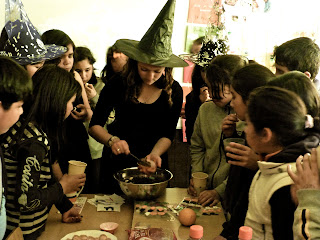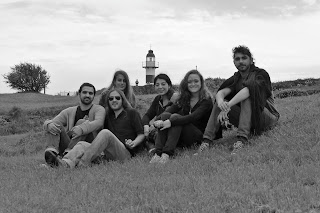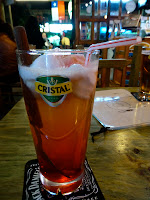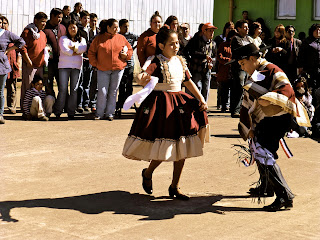"THE 20s ARE LIKE the stem cell of human development,
the pluripotent moment when any of several outcomes is possible.
Decisions and actions during this time have lasting ramifications. The
20s are when most people accumulate almost all of their formal
education; when most people meet their future spouses and the friends
they will keep; when most people start on the careers that they will
stay with for many years. This is when adventures, experiments, travels,
relationships are embarked on with an abandon that probably will not
happen again.
"
Here's a little bedtime reading... if you have the time, it offers some pretty interesting perspectives.
Here I am, smack dab in the prime of my life, in the middle of South America (well actually, more like along the south-western tip) doing God knows what in God knows where. Living in a small little country town in Chile where everyone knows everyone else. Miles from the nearest foreigner and I have no one here that can even remotely begin to relate to me.
It's partly exhilarating, as if there's this chapter of my life--a secret if you will--that will forever be kept for me and only me. It's mine forever and I'll never have to share it with anyone else.
It's also greatly isolating. I am alone in my thoughts and in my perspective. No one here knows where I've been, what I'm thinking or how I might be feeling. And I know, despite my greatest attempts to articulate these feelings
to either the people here or my loved ones back at home, no one will
ever know or be able to truly understand what I'm going through. So I know that any cries out for guidance or understanding will forever be in vain.
Yes, it's fun to tell you all about my fun and exciting weekend adventures or my new and interesting cultural encounters, but there is a crucial part of my experience here that I believe must be addressed. A part so prevalent that it has become an integral part of each and every day I've spent in Chile thus far. To ignore it, would be to undermine the incredible growing and developmental experience that it is. I am not on vacation. It is rather an intense learning experience that will forever impact the type of person I become. Here are a few words describing my experience here that you probably wouldn't have expected...
Frustrating, Confusing, Aggravating, Dumbfounding, Isolating, and
Lonely.
I live with a family (and I have another that is always asking me to come over), I work an 8:30-5 job during the week, I have over 375 students who constantly compete for my attention and approval, there is a network of other volunteers on facebook whom I speak to almost daily, I have great internet service at my house so that I can contact anyone I like whenever I like, and yet still not a day has passed, where--if even for just a brief moment--I have felt lonely.
No matter how long I am here in Perquenco, I will always be the Gringa English teacher. There will always be those who talk down to me assuming I don't speak or understand a word of Spanish (or worse, those to talk to me through others as if I need a translator). There's a certain comfort in being around people who are similar to you, who know where you've been and why you area the way you are. (Perhaps thats why I felt so lonely in my first few weeks back from Argentina.) I will forever carry with me, the fond sentiments of my hometown, of Baltimore, of my family and friends, and as long as those are still prevalent in my memory and heart, I will never feel completely at home. Not to mention the daily frustrations of cultural and language barriers.
Some examples, just to name a few...
- Being in a conversation where the ONLY word you don't know just happens to be the topic of conversation.
-When someone comes up to you and speak so fast your head starts spinning in circles, and no matter how many times you tell them you don't understand they still refuse to talk slower.
-The word you need has JUST left your mind and you're left staring out into space in the middle of a conversation with nothing left to say and no idea where to go from there.
-Someone tells a joke and the whole room erupts in laughter, except for you. It's times like this when you long for American humor again. (believe it or not, sense of humor is different in every culture)
-You're walking down the street and you say hello to a passerby, because that's what everyone else does in Perquenco, and you're received with a look as if you just landed from outer space.
-Worst of all, when you're frustrated, you realize there is no one to turn to, no one that will truly understand what you're going through. And then the fact that you have no one propagates more frustration and feeling of loneliness and isolation.
It's reflective to say the least. A situation that calls for deep self
reflection and criticism... not to mention constantly begs the question:
What the hell am I doing here?
But there is consolation in it all. There are moments, gems, that make all of this worth while.
They say a smile is worth a thousand words. Well I'm willing to raise them a thousand more. A smile can have hundreds of different meanings, feelings and implications. And for a foreigner, it can be a hail mary.
Living here, I've found that a smile can get you through the best of times, and the worst of times.
Here's just a few of the many different smiles you might not have known existed...
-
The blind first-day-of-school optimism smile. It doesn't have to be the first day of school necessarily, just any situation at all that you're walking into blind, where you have no idea what to expect, or what the hell to do with yourself so you just stand there and smile like a dumbass until someone comes over to help you or give you instruction.
-
The new people smile. I know I'm the only foreigner in town, but I didn't arrive via spacecraft and I promise I don't bite.
-The confused smile. I can't even begin to guess what you're saying to me so I'm just gonna smile and hope you get the hint to repeat yourself.
-The I'm lost please help me smile. I have no idea what I am, what I'm doing here, or where I'm going. This smile is a desperate cry for someone to please walk over and help the poor lost gringa.
-The dumbfounded goofy smile. I have no idea what the hell you just said to me, but you're laughing, smiling, and looking at me as if I should respond so I'm going to give a little chuckle and smile until we move to the next topic.
-
The frustrated smile. Nothing is going right. I'm so frustrated and angry right now I want to scream. But instead, I have to sit here and force the worst fake smile imaginable in hopes that I might actually get somewhere.
-The on the verge of tears smile. When you feel as if the world is against you. When you're lonelier than ever and you just want to curl up in bed and cry. But instead you have to go to school and be 100% of your BEST self or else there is no chance in hell that you're students are even going to give you the time of day. (Fun fact, when you're a teacher, you're not allowed to have an off-day, because if you don't care, neither will you're students.) So you smile in a desperate attempt to hold back the tears, so that you can fake it to the rest of the world, and even to yourself if you're lucky, that everythings okay.
But just when you feel as if you've lost all hope...
There's The I just learned something new smile. Whether it be a new word, a new spanish phrase, or a fun new cultural tidbit--and trust me, there are many of these each day--they're all small little victories within themselves.
-
The rewarding smile. Walking out of a successful class or a great day at school. That, "I can actually do this" feeling.
-
The friendly smile. When you're walking down the street and one of your students pop up out of nowhere with a big wave and an enthusiastic "¡Hola Tía!". Or even when you run into any familiar face and exchange a brief hello... the fact that it's a familiar face in a foreign country is a celebration in itself.
-
The belonging smile. The response I have to the millions of hugs, kisses and smiling faces that greet me every day I walk into school. These kids are thrilled to see me, which means I must be doing something right. What's even better is I'm thrilled to see them! They give me a reason to get up on even the hardest and most challenging days.
-
The thank god I have my kids smile. I have 5th and 6th graders lined up to participate in my after school English club. They're ages 10-12, anxious to learn and just itching to spend more time with me. They come up to me every day asking me millions of questions about the United States and trying to teach me all about their culture in Chile. "Tía, do you know what this is?" "Tía, try this!" (translated version of course). I swear, they can put a smile on my face on even the crappiest of days where I just want to dig myself into a hole.

-
The is this real life smile. There are countless times throughout my stay here when I have to take a second to give myself a reality check: "Is this really happening to me right now?" For example when the whole school just gets up in the middle of class and walks outside into the plaza and has a big Cueca dancing festival and one of my students grabs my hand and drags me into the dancing crowd of kiddies. Not to mention, the whole "wing-it" life style down here in Chile allows for some pretty awesome surprises. One thing leads to another and before you know it you're snowshoeing around an active volcano! I've had too many instances here where I have to take a step back and let my brain catch up to the rest of me, and by the time I realize, "yes, this is really happening" I find that I'm smiling from ear to ear.
-
The new friend smile. One thing you learn very quickly in this country is that Chileans are INCREDIBLY friendly and welcoming people. They love to talk, touch, share and meet new people. For example, it is not unusual for you to meet someone for the first time and have them invite you to their home that same day. I have received countless invitations from Chileans anxious to share a little bit of their country with me. For example, the people above, are the directors of the national park and invited Carlyn and I to take part in an invite only snowshoeing adventure through a national park. At said adventure, we met Jorge (pictured right) who after a couple hours of trekking alongside us, invited us to his house the following day for lunch. This is a typical day in Chile.
And then there's the best smiles of all...
-The ear-to-ear, every single tooth (or lack there of) smile. Jumping up and down, waving ferociously and screaming "¡Hola Tía! ¡Hellooooooo!" "Mama, ¡¡ella es la tía de ingles!!" (Mom, that's my english teacher!) The look on my kid's faces (especially the little ones) when I run into them around town.

-
The I get it smile. That smile that spreads across a student's face as soon as that light bulb goes on and everything clicks. That momentary satisfaction, when they don't even realize their smiling. And what's even better is knowing that I helped them get there.
-The I just taught the Tía something smile. I can't tell you how much delight my kids get from being able to teach ME something. They love showing me things, teaching me about their culture and making me try new foods. For example, in the picture to the left, my 4th graders got a kick out of trying to teach me the Cueca. Lucky for them, I love learning all of it just as much as they love teaching me. Maybe even more!
-
The running smile. There comes a time at the end of each day, where I go for my afternoon run and reflect. I think about everything from my daily goings-on to where I am and what I'm doing in my life right now. For those that know me best, you'll know that this is my way of coping with all of life's ups and downs. It maintains my sanity and piece of mind throughout this entire emotional roller coaster. And as I'm running through these picturesque landscapes that no camera can do justice to, I get that same "WOW, this is really happening" feeling. I feel more alive than ever and no matter how hard I try, I can't hold back a smile.
 Until one day, he learned that a beautiful white colt had arrived in Malalcahuello (the neighboring community). Upon this new the chief united his tribe and announced:
Until one day, he learned that a beautiful white colt had arrived in Malalcahuello (the neighboring community). Upon this new the chief united his tribe and announced: Upon these screams, Rayén and Nahuelcura looked around, but found no escape. The Mapuche had circled them in from all ends and forced them to the edge of a cliff. The couple was trapt. The only way out, was to jump...
Upon these screams, Rayén and Nahuelcura looked around, but found no escape. The Mapuche had circled them in from all ends and forced them to the edge of a cliff. The couple was trapt. The only way out, was to jump...



















































